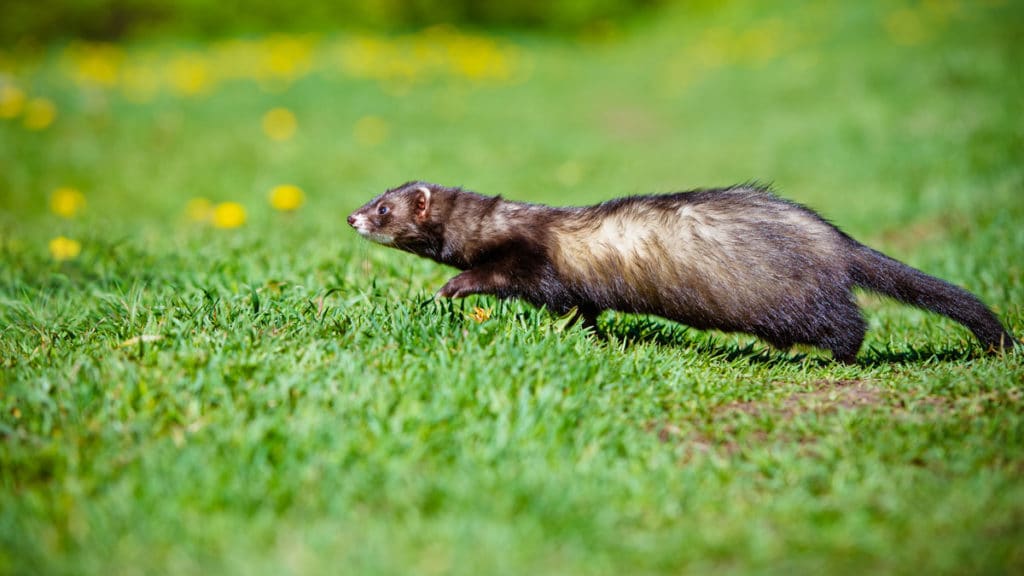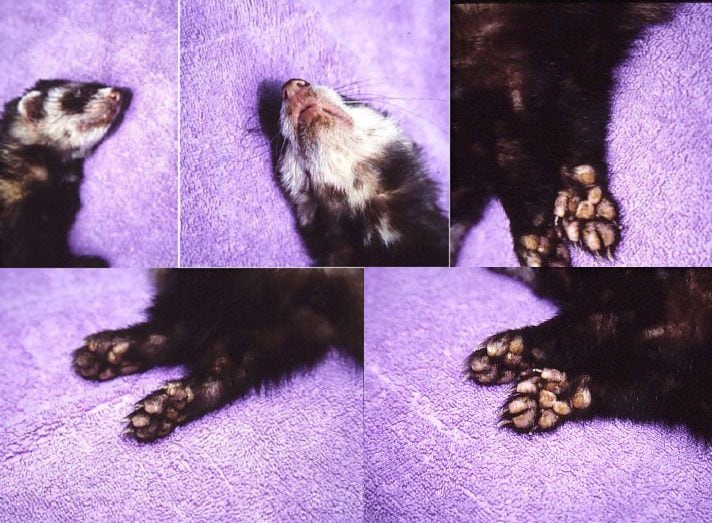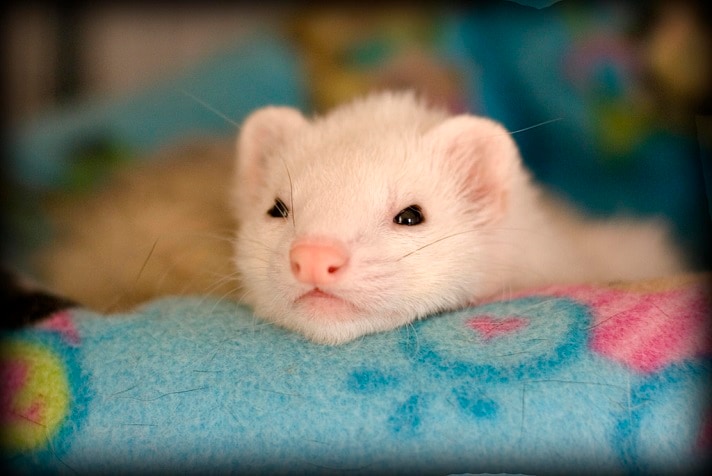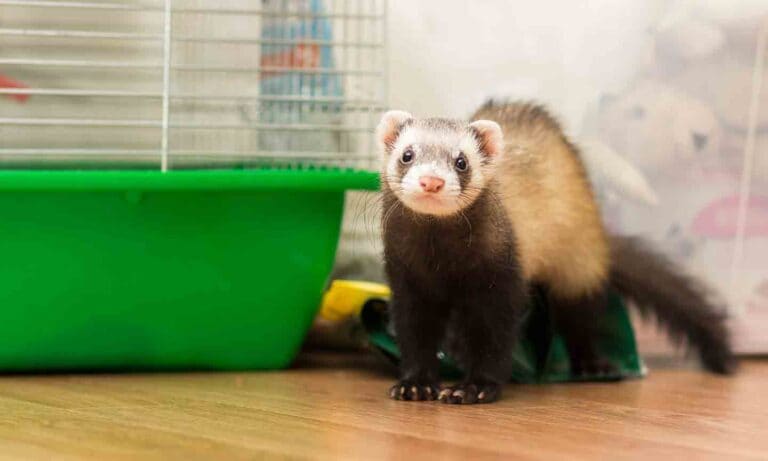Our little ferrets do not have the lingual capabilities that humans do, but that does not mean that they are unable to communicate. Ferrets make many sounds and movements to try to convey what they want. Unfortunately, people don’t always understand what ferrets are trying to say. Use this ferret-to-human dictionary to help you understand your pet better.
How Ferrets Express Emotions
Afraid
Your ferret may shriek and hide, or tremble severely and cower down. If you have just acquired your ferret, let your pet come out to you rather than reaching in to grab it. In its state of fear, your ferret may bite you. Try offering it a treat on a spoon to lure it to you.
Curious
Cats are known for their curiosity, but ferrets aren’t far behind! A ferret usually keeps its body low to the ground and circles something to check it out. Ferrets may also make a soft “dooking” or chuckling sound to indicate that they are excited about their find.
Danger
If a ferret thinks that it is in danger it may screech, hiss, arch its back, foof (release scent from its anal glands if it still has them) or poop on the floor.
Excited
Your ferret may dance the Weasel War Dance or may just produce a very loud dooking sound. While a cautious ferret will dook with its head down, an excited ferret will usually dook with its head raised. The more excited the ferret is, the faster and louder it dooks.
Fearful
Your ferret may hiss and shy away from something with its head down if it is fearful, but won’t actually run and hide like a ferret that is truly afraid of something.
Hungry
A ferret hanging around an empty food dish wants something to eat. Your ferret may also walk up to you and then walk to the dish to indicate what it wants. It is usually best to have dry food available to your ferret at all times so that it can eat when it wants. Just make sure that the ferret food is changed regularly so it stays fresh, especially in humid climates.
Mad
A ferret that is mad about something may pout, hiss, bite or chase another ferret. It may even hiss at or bite its owner, but aggression toward people is rare in an established pet.
Pain
Ferrets are very stoic animals that don’t often express pain. Some exceptions are: If you step on their tail or on a toe they might shriek, hiss or dook very fast as if cussing you out; or if they are not feeling well they might flatten themselves down and squint their eyes. A trip to the veterinarian is usually in order if a ferret isn’t feeling well.
Sadness
Ferrets can get depressed, just like people. The loss of a cagemate or a human companion can trigger depression. The ferret might search for its companion in places that their missing friend usually occupied. The ferret might slouch down like it is in pain and sigh a lot, but it won’t have the squinty eyes of a ferret in physical pain.
Territorial
Some ferrets are very territorial or possessive of certain toys, beds, litter boxes or treats. I have seen ferrets have hissing fits over a favorite treat that sometimes even progresses to a shrieking match. This is usually an act between two ferrets and not between a ferret and a person. When you give a favorite treat, make sure the ferrets are far enough apart not to react to each other, and have extra treats on hand so if one ferret starts to bully the other, you can lure it away with the extra treat.
A Health Concern For Ferrets
Insulinoma
This isn’t an active communication from the ferret, but it’s a good idea to learn the signs of this ailment so you know if your ferret may have it.
Insulinoma is a tumor on the pancreas that makes the ferret’s blood sugar drop. Symptoms may include drooling, “spacing out,” sleeping more and sometimes vocalizations. These vocalizations may include sounds like hiccupping, whooping or even screams. The ferret may also have seizures. Talk to your veterinarian about this disease while your ferret is still young so you know what to do if your ferret develops insulinoma later in life. Insulinoma is usually fatal if not treated.
What Your Ferret’s Behavior Means
Bouncing Around
This is also called the Weasel War Dance. This is a sign of excitement and joy. Your ferret is very happy about something and wants the whole world to know it. This can also indicate that your ferret wants to play. Ferrets sometimes do this with such abandon that they bounce into furniture and have even bounced off beds or down stairs. Keep your ferret in a safe and secure area if it tends to do this often.
Grabbing You With Its Teeth
This is not biting; it is a firm, but gentle grip on your finger. It usually means that your ferret wants you to follow it. Some ferrets actually try to drag your hand into their cage. They are treating you like a favorite toy. If you try to pull your hand back, though, the ferret may grab you harder, which can be painful.
Jumping
If your ferret is by your feet and is jumping up at your leg, this is usually a sign that it wants to be picked up or wants you to play. If you are in the kitchen near the counter where its treats are kept, it might be begging for a treat.
Kissing
Just as in humans, your ferret kissing you on the lips can be a sign of affection. It can also mean that your ferret likes the flavor of your lip balm or of the turkey sandwich that you had for lunch.
Licking
Most ferrets lick themselves to groom themselves. But if your ferret licks you, it can be indicative of a few things.
1. It could be trying to groom you.
2. It likes the taste of your salty skin or a lotion that you are wearing.
3. It could be getting ready to bite you. No one really knows why some ferrets do the lick-lick-chomp behavior. Perhaps the first two to three licks are the ferret’s way to warn you that it wants to be put down. The “chomp” part gets the ferret its way if you ignore the first part of the warning.
Nipping
Some ferrets nip to get attention. A ferret might nip your feet to get you to move so it can chase you. It might nip your hand to let you know that it doesn’t like something that you are doing.
Opening Its Mouth While Playing
This is usually just an indication that your ferret is very excited. A ferret that does this may be more inclined to nip you in its excitement.
Running Back And Forth
If your ferret runs to you and then runs away from you and then back again, it could be inviting you to play or asking you to follow it. Maybe your ferret’s food or water dish is empty or its toy has rolled under something and it wants you to come and get it out.
This is not a ferret’s entire “vocabulary,” but it certainly gives you something to ponder. Observe your ferret carefully and add your own list of “words” to ours by adding a comment below!
Posted by: Chewy Editorial
Featured Image: otsphoto/Shutterstock
Share:









